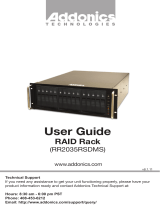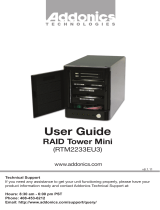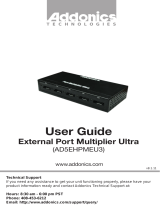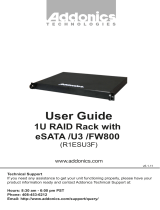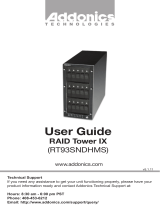Page is loading ...

Technical Support
If you need any assistance to get your unit functioning properly, please have your
product information ready and contact Addonics Technical Support at:
Hours: 8:30 am - 6:00 pm PST
Phone: 408-453-6212
Email: http://www.addonics.com/support/query/
v5.1.11
www.addonics.com
T E C H N O L O G I E S
User Guide
RAID Tower XIII
(RT134SDMS)

www.addonics.com Technical Support (M-F 8:30am - 6:00pm PST) Phone: 408-453-6212 Email: www.addonics.com/support/query/
Unpacking and Overview
Mini SAS Cable
Power cord (US version shown)
RAID Tower XIII Unit

Array Host LED: glows to indicate the port multiplier is
properly connected to a host adapter, blinks to indicate
activity.
Array Error LED: glows to indicate a fault-tolerant
RAID array is either degraded or offline, blinks to
indicate a fault-tolerant RAID array is rebuilding.
Each of the Disk arrays in RAID Tower XIII is equipped
with an audible alarm. Should the array be configured
as a RAID array and a drive failure occurs, the audible
alarm will sound.
www.addonics.com Technical Support (M-F 8:30am - 6:00pm PST) Phone: 408-453-6212 Email: www.addonics.com/support/query/
Array 1 Host
Array 1 Error
Array 2 Host
Array 2 Error
Array 3 Host
Array 3 Error
Array 4 Host
Array 4 Error
Power LED
Power Switch
Door
Lock
Array
Power
LED
(each array)
Drive power (blue)
and activity (red)
LED (each drive)
Array 1
Array 2
Array 3
Array 4
Array 1
Array 2
Array 3
Array 4

www.addonics.com Technical Support (M-F 8:30am - 6:00pm PST) Phone: 408-453-6212 Email: www.addonics.com/support/query/
Insert Hard Drives
with top facing
right
Installation
1. Be sure front and rear power switches are in
the OFF position.
2. Connect power cord to the unit.
3. Connect the Mini SAS cable from the back of
the RAID Tower to the computer.
4. Turn on main power switch on the back of the
unit. The power switch on the front may be
used for normal operation.
Installing drives into the
RAID Tower XIII
1. Be sure the lock on each drive doors is in
an unlock position. If not use the key that
comes with the Disk Array to unlock the
drive door. Pull on the door lever to swing
open the drive door all the way.
2. Slide a 3.5” SATA hard drive into the drive
slot with the drive connector side facing
in. Be sure to orient the hard drive
correctly as shown in the yellow label on
the inside of the drive door – with drive
door swing open at the bottom, the top of
the hard drive should face to the right.
The drive should slide all the way into the
slot with very little resistance. Forcing the
drive into the slot will cause the drive
damage or permanent damage to the Disk
Array.
3. Once the drive is all the way into the
driver slot, close the door all the way until
the drive door latches securely. This will
engage power and data connection with
the hard drive. The LED light for the drive
slot should light if the Disk Array already is
powered on. You may lock the drive door
with the key.
4. To remove the hard drive from the Disk
Array, simply follow the steps 2-3 in
reverse.
Mini SAS Connector
Rear Power Switch

www.addonics.com Technical Support (M-F 8:30am - 6:00pm PST) Phone: 408-453-6212 Email: www.addonics.com/support/query/
Port Multiplier Compatibility
When configured as a set of individual drives, the Port Multiplier will only work with a
Port Multiplier aware host. Identify your host controller and check with its hardware
manufacturer if you are unsure. Addonics offers several Port Multiplier capable host
adapters.
Resetting the RAID Mode
NOTE: This procedure destroys all RAID data. It should not harm individual drives
or their contents; however, creating or running backups of all data is strongly
recommended before proceeding.
1. Power down the unit and set the dip switch to the factory default setting (all
switches OFF).
2. While holding the SET button with a ballpoint pen, turn the unit on. A long beep will
sound from the Port Multiplier. The SET button may be released once the long beep
stops.
Setting or Modifying the RAID Mode
NOTE: Setting or modifying the RAID mode destroys all data.
1. Follow the procedure for resetting the RAID Mode.
2. Power down the unit and set the dip switch to the desired RAID Mode.
3. While holding the SET button with a ballpoint pen, turn the unit on. A long beep will
sound from the Port Multiplier. The SET button may be released once the long beep
stops.
If instead of a long beep the Port Multiplier sounds a series of short beeps, an error
has occurred during configuration of the array.
Windows users may install the JMicron HW RAID Manager application located on
the SATA Controller CD. In the CD, browse to Configuration Utilities → JMB393. The
JMicron HW RAID Manager can be used to create, modify, and monitor the health
status of the RAID drives, and provide status alerts. When configuring the RAID
mode using the RAID Manager application, it is strongly recommended to leave the
dip switch in the factory default setting.
Using identical drives for all settings other than JBOD or LARGE is strongly
recommended. Creating a LARGE array using drives that have different properties
will use all space on all members, and performance will match that of the member in
use during any particular I/O operation. Creating a RAID using drives that are not all
the same size will result in all members using only as much space as the smallest
member. Creating a RAID using drives that have different performance will degrade
the overall performance of the array.

BZS Switch (SW1:1):
The BZ switch is used to silence the audible alarm buzzer. The OFF position
permits the audible alarm, and the ON position silences the audible alarm. The BZ
switch has immediate effect.
EZ Switch (SW1:2):
The EZ (spare) switch inhibits spares when ON. When in the OFF position, all
individual drives (not defined as members of an array) are considered spare.
Should a RAID become degraded, when the EZ switch is in the OFF position a
spare drive will be used automatically to rebuild the RAID, if present. EZ mode is
determined when the unit is powered up. Changing the switch will have no effect
until the unit has been re-powered.
RAID Mode Switches M2, M1, M0 (SW1:3 – SW1-5)
The RAID Mode switches define what type of RAID will be initialized when the unit
is powered up while the RAID Mode button is held down. Each type of RAID has
different properties and requirements, as follows:
1 Audible alarm is recommended at all times.
2 EZ mode has no effect in JBOD mode.
3 Disabling EZ for RAID 0 and LARGE is strongly recommended.
www.addonics.com Technical Support (M-F 8:30am - 6:00pm PST) Phone: 408-453-6212 Email: www.addonics.com/support/query/
Dipswitch Posion 1 2 3 4 5
Raid Mode
BZS
1
EZ
M2
M1
M0
JBOD (Individual
drives)
* FACTORY DEFAULT
SETTING
OFF OFF
2
OFF OFF OFF
0
OFF
ON
3
ON
ON
ON
1 or 10
OFF
OFF
ON
ON
OFF
3
OFF
OFF
ON
ON
OFF
5
OFF
OFF
OFF
ON
OFF
CLONE
OFF
OFF
OFF
ON
ON
LARGE
OFF
ON
ON
OFF
ON

JBOD Mode (Individual Drives)
Number of drives: at least 1
Unit capacity: N/A (100% of each individual drive)
Spares: no
Fault tolerance: none
JBOD mode offers all connected units to the host adapter, no RAID is defined at all.
NOTE: JBOD mode requires a SATA controller featuring Port Multiplier support for
eSATA connections.
NOTE: Optical drives can only be configured as JBOD using an eSATA connection.
RAID 0 (Stripe set)
Number of drives: at least 2
Unit capacity: size of each member times number of members.
Spares: no
Fault tolerance: none - if any member is lost all data is lost.
RAID 0 “stripes” the file system across the array by placing sectors of data
sequentially between drives in a specific order.
RAID 1 or 10 (Mirror set, Stripe of mirror sets)
Number of drives: 2 (RAID 1) or 4 (RAID 10).
Unit capacity: size of one member (RAID 1) or size of two members (RAID 10).
Spares: yes – if EZ mode is not disabled and 3 (RAID 1) or 5 (RAID 10) drives are
present, the array will be initialized with a spare.
Fault tolerance: RAID 1 can withstand the loss of one drive without losing data.
RAID 10 can withstand the loss of one drive from each mirror set without losing
data.
RAID 1 works by duplicating the exact same data on two drives.
RAID 10 works by using two RAID 1 sets configured as members of a RAID 0.
Disks 1 and 2 are mirrored, disks 3 and 4 are mirrored, and the two mirror sets are
striped together.
www.addonics.com Technical Support (M-F 8:30am - 6:00pm PST) Phone: 408-453-6212 Email: www.addonics.com/support/query/

RAID 3 (Stripe set with dedicated parity)
Number of drives: at least 3
Unit capacity: size of one member times number of members minus one.
Spares: yes
Fault tolerance: can withstand the loss of one drive without losing data.
RAID 3 works by striping data for individual I/O blocks across all members except
one, which contains parity data for the stripe set computed by the Port Multiplier.
RAID 5 (Stripe set with striped parity)
Number of drives: at least 3
Unit capacity: size of one member times number of members minus one.
Spares: yes
Fault tolerance: can withstand the loss of one drive without losing data.
RAID 5 works by striping entire I/O blocks across all members of the set, with each
member taking turns carrying parity data computed by the Port Multiplier.
CLONE (Mirror set)
Number of drives: at least 2
Unit capacity: size of one member.
Spares: yes
Fault tolerance: can withstand the loss of any number of drives without losing data
as long as at least one complete member remains online.
CLONE mode works the same way as RAID 1, by maintaining a complete copy of
the entire set of data on each drive.
LARGE (Spanned set)
Number of drives: at least 2
Unit capacity: 100% of all drives together regardless of differences in size
Spares: no
Fault tolerance: cannot withstand the loss of any drives without losing data.
However, some data may be recovered as long as the drive(s) carrying the file
system data (boot record, directory, etc.) remain online.
LARGE mode is neither a RAID nor is it a JBOD. It works by declaring the sum of
all available space of the member drives as a single unit, without striping the data.
As each member is filled, new data is stored on the next.
www.addonics.com Technical Support (M-F 8:30am - 6:00pm PST) Phone: 408-453-6212 Email: www.addonics.com/support/query/

Notes about Spare Drives
If EZ mode is disabled (SW1:2 ON), all individual drives not configured as array
members will be offered to the host adapter as separate units.
To create an array with one or more spares, set or modify the RAID mode using
fewer than 5 members, while the spares are disconnected from the Port Multiplier.
When EZ mode is enabled, individual drives connected when an array is present
are considered spare.
Spare drives must be equal to or larger in size than the smallest member.
When any type of array is defined, individual units will be considered spare. RAID 0
and LARGE arrays are not fault-tolerant and spare drives will not be useful;
therefore, disabling EZ for these arrays is recommended.
When a spare drive is present and a fault-tolerant RAID (1, 10, 3, or 5) is defined,
EZ mode will automatically rebuild any available spares into the array.
www.addonics.com Technical Support (M-F 8:30am - 6:00pm PST) Phone: 408-453-6212 Email: www.addonics.com/support/query/

www.addonics.com
Phone: 408-573-8580
Fax: 408-573-8588
Email: http://www.addonics.com/sales/query/
CONTACT US
/
